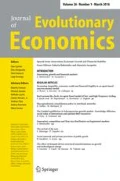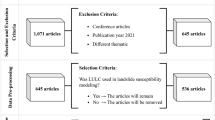Abstract
Two lines of reasoning on very long term socio-economic change, which was a basic issue of classical economic thinking, are confronted: New Institutional Economics (NIE) and Evolutionary Economics (EE). It is demonstrated that EE offers an explanation which is both more consistent and more comprehensive. The case in point is the first economic revolution.
Similar content being viewed by others
References
Binswanger P, Pingali L (1984) The Evolution of Farming systems and Agricultural technology in Sub-Saharan Africa, Discussion Paper, Report no. ARU 23, The World Bank, Washington D.C.
Beckmann J (1779) Beyträge zur Ökonomie. Technologie, Polizey and Cameralwissenschaft. Vandenhoeck, Göttingen
Boserup E (1965) The Conditions of Agricultural Growth. The Economics of Agrarian Change under Population Pressure. Aldine Publishing Company, New York
Boserup E (1981) Population and Technological Change. Univ. of Chicago Press, Chicago
Boserup E (1986) Shifts in the Determinants of Fertility in the Developing World. In: Coleman D, Schofield R (eds) The State of Population Theory, pp. 239–255. Basil Blackwell, London
Boulding KE (1981) Evolutionary Economics. Sage Publications, Beverly Hills
Caldwell JC (1982) Theory of Fertility Decline. Academic Press, London
Campbell BMS (1983) Agricultural Progress in Medieval England: Some Evidence from Eastern Norfolk. The Economic History Review 36:26–46
Cantillion R (1755) Essai sur la nature du commerce en général. Amsterdam
Cassel G (1918) Theoretische Sozialökonomie. Scholl, Leipzig
Chao K (1986) Man and Land in Chinese History. An Economic Analysis. Stanford Univ. Press, Stanford
Curtin PD (1984) Cross-cultural Trade in World History. Cambridge University Press, Cambridge
Day RH, Walter J-L (1989) Economic Growth in the Very Long Run: on the Multiple-Phase Interactions of Population, Technology, and Social Infrastructure. In: Barnett WA, Geweke J, Shell K (eds) Economic Complexity, pp. 253–289. Cambridge University Press, Cambridge
De Gregori TR (1987) Ressources are not. They become: an institutional theory. Journal of Economic Issues 21:1241–1263
Eggertsson T (1990) Economic Behavior and Institutions. Cambridge University Press, Cambridge
Georgescu-Roegen N (1976) Energy and Economic Myths. New York
Graff HJ (1987) The Legacies of Literature. Indiana Univ. Press, Bloomington
Hausfater G, Blaffer Hrdy S (1984) Infanticide. Aldine Publishing Company, New York
Harris M (1985) Good to Eat. Riddle of Food Culture. Simon & Schuster, New York
Hayami Y, Ruttan VW (1985) Agricultural Development. An International Perspective. John Hopkins Univ. Press, Baltimore and London
Hayek von FA (1952) The sensory order. 2nd edn. London 1976
Hesse G (1979) Staatsaufgaben. Nomos, Baden-Baden
Hesse G (1982a) Die Entstehung industrialisierter Volkswirtschaften. Mohr, Tübingen
Hesse G (1982b) Die Änderung von Rechten im Property-Rights-Ansatz. In: Wirtschaftswissenschaftliches Studium (WIST), Vol. 11, No. 6, pp. 249–257, Vahlen, München
Hesse G (1983) Zur Erklärung der Änderung von Handlungsrechten mit Hilfe ökonomischer Theorie. In: Alfred Schüller (ed) Property Rights und ökonomische Theorie, pp. 79–109. Vahlen München
Hesse G (1984) Industrialisierung in tropischen Regionen. In: Koch WAS (ed) Folgekosten von Entwicklungsprojekten — Probleme und Konsequenzen für eine effizientere Entwicklungspolitik, pp. 33–103. S.V.S., N.F., 143. Duncker & Humblot, Berlin
Hesse G (1986) Liberale Wirtschaftspolitik im evolutorischen Prozeß. In: Nutzinger HG (ed) Liberalismus im Kreuzfeuer, pp. 79–102. Knecht, Frankfurt
Hesse G (1987a) Innovationen und Restriktionen. Zum Ansatz der Theorie der langfristigen wirtschaftlichen Entwicklung. In: Borchert M, Fehl U, Oberender P (eds) Markt und Wettbewerb, pp. 195–226. Haupt, Bern
Hesse G (1987b) Intensivierung der Landnutzung und Arbeitsproduktivität. Münster: Gesellschaft für Entwicklungsforschung und Internationale Beziehungen e.V.
Hesse G (1988) Innovative Anpassung, Würzburg, MS
Hesse G (1989) Die frühe Phase der Industrialisierung in der Theorie der langfristigen wirtschaftlichen Entwicklung. In: Pierenkemper T (ed) Landwirtschaft und industrielle Entwicklung, pp. 139–171. Franz Steiner Verlag, Stuttgart
Hesse G (1990) Evolutorische Ökonomik oder Kreativität in der Theorie. In: Witt U (ed) Studien zur evolutorischen Ökonomik I, pp. 49–73. Duncker & Humblot, Berlin
Hesse G (1992a) A New Theory of Modern Economic Growth. In: Witt U (ed) Explaining Process and Change. Contributions to Evolutionary Economics. Michigan Univ. Press, Michigan
Hesse G (1992b) Innovative Anpassung in sozio-ökonomischen Systemen. In: Biervert B, Held M (eds) Evolutorische Ökonomik. Campus, Frankfurt
Huang PCC (1991) The Paradigmatic Crisis in Chinese Studies, Paradoxes in Social and Economic History. In: Modern China, Vol. 17, No. 3, pp. 299–341
Kuckenburg, M (1989) Die Entstehung von Sprache und Schrift. DuMont, Köln
Leach GL (1976) Industrial Energy in human food chains. In: Duckham AN (ed) Food Production and Consumption, pp. 371–382. North-Holland, Amsterdam
Leibenstein H (1954) A Theory of Economic-Demographic Development. Princeton University Press, Princeton, N.J.
Malthus TR (1798) An essay on the principle of population as it affects the future improvement of society. London
Mill JS (1848) Principles of political economy, with some of their applications to social philosophy. London
Müller J (1924) Der Geburtenrückgang Gustav Fischer, Jena
Müller J (1927) Geburtenrückgang. In: Handwörterbuch der Staatswissenschaften, Vol. 4, 4th edn., pp. 641–647. Gustav Fischer, Jena
North DC (1981) Structure and Change in Economic History. Norton, New York
North DC (1988) Theorie des institutionellen Wandels. Mohr, Tübingen
North DC (1990) Institutions, Institutional Change and Economic Performance. Cambridge University Press, Cambridge
Phelps-Brown H, Hopkins SV (1981) A perspective of wages and prices. Methuen, London.
Pöppel E (1985) Grenzen des Bewußtseins. Deutsche Verlagsanstalt, München
Pöppel E (1989) Eine neuropsychologische Definition des Zustands “bewußt”. In: Gehirn und Bewußtsein, pp. 17–32. VCH Verlagsgesellschaft, Weinheim
Raychaudhuri T, Habib I. The Cambridge Economic History of India. Vol. 1, pp. 1200–1750. Cambridge Univ. Press, Cambridge
Ricardo D (1817) On the principles of political economy and taxation. London
Ruthenberg H (1964) Landwirtschaftliche Entwicklungspolitik in Tanganyika. München
Salehi-Isfahani D (1988) Technology and Preferences in the Boserup Model of Agricultural Growth. Journal of Development Economics 28:175–191
Sahlins M (1984) Stone Age Economics. Aldine Publishing Company, Chicago
Smith A (1759) Theorie der ethischen Gefühle. Leipzig
Smith A (1776) An Inquiry into the Nature and the Causes of the Wealth of Nations (reprint). Random House, New York
Stanhill G (1984) Energy and Agriculture. Springer, Berlin
Thünen JH (1826) Der isolierte Staat in Beziehung auf Landwirtschaft und Nationalökonomie. Wiegandt, Hempel & Paren, Rostock
Wagner A (1870) Die Abschaffung des privaten Grundeigentums. Duncker & Humblot, Leipzig
Weede E (1990) Wirtschaft, Staat und Gesellschaft. Mohr, Tübingen
Weizsäcker, CF (1971) Die Einheit der Natur. Hanser, München
Wesel U (1985) Frühformen des Rechts in vorstaatlichen Gesellschaften. Suhrkamp, Frankfurt
Winterhalder B, Smith E (1981) Hunter-gatherer foraging strategies. University of Chicago Press, Chicago
Witt U (1991) Evolutionary Economics — an Interpretative Survey. In: Papers on Economics & Evolution #9104 edited by the European Study Group for Evolutionary Economics, Freiburg
Author information
Authors and Affiliations
Rights and permissions
About this article
Cite this article
Hesse, G. Land use systems and property rights. J Evol Econ 2, 195–210 (1992). https://doi.org/10.1007/BF01202418
Issue Date:
DOI: https://doi.org/10.1007/BF01202418




